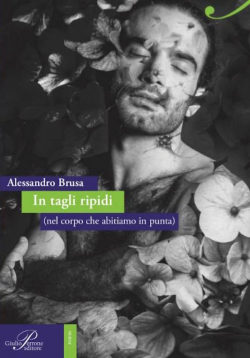Editorial
by Francesca Del Moro
When asked to write their “love letter to the planet” the poets selected here below have deduce from the Earth’s geography a multitude of meanings, contrasts and mysteries. In her sophisticated and epic verses, focused on the sequence of anaphoric hypothesis, Anna Maria Ferramosca explores primordial landscapes and artificial interferences, questioning the Earth about her measurable aspects and the unconceivable mysteries of life. And it is one unconceivable element, our essence as human beings, that marks the fugacious and vanishing scenarios recurring in Cristina Bove’s verses. Another juxtaposition represents the core of Claudia Zironi’s brief and powerful composition: the unblinking stillness of the rocks opposed to the surrounding throbbing of life, the innocence of the inaction flows into a game through a semantic stunt. Valentina Premeri’s verses analyse the relationship between the Earth personification, described with love and great care, and her sons, the human beings, through a series of meaningful images that guide us to a hopeful conclusion. In the same way, Pina Piccolo’s evocative and picturesque poetry represents a real invitation to dive into the wonders of our planet, in which reside its and our history, our true meaning.
Getting used to be traceless
by Cristina Bove
- Can you see the walls? Asks the half-asleep
master builder of the cliff-side houses
- Can you see the rocks preserving the marks?
it’s a land that flows like sand
a wandering world
nobody escapes but nobody stays
it is snowing salt everywhere and it wipes out
the mansions and the slums
the delicate manners and the abominations
_everything passes_
no matter if shooting stars or cave engravings
history is an illusion of human beings
but the ungraspable
whether you live it through plans or dreams
does not need to be recorded
whether you write it or not
whether you say it or withhold it
the thought is a trace of the universe
EARTH
by Valentina Premerl
Never completely
silent,
pregnant with pity
- arched to her knees
the veils spread on the valleys
stretched out to us
bent in humid humility
she raises her eyes
tenderly waiting for me
for you reflected in the stars
- astronauts we are
lost in sleep
time
our mother earth
inseminated by the dream
- in her arms
she rustles the foliage
whining during delivery
she whispers in the woods
the truth
womb in labour
- is filled with debris
the human throat
by now dry
contracts
amniotic cradle
the push
towards the awakening.
SONG OF CONFIRMATION
by Annamaria Ferramosca
What if it were
the pure coincidence of parameters
drawing
the innocent bow of the event
Just a youthful breeze
the scent of the first algae
the turbulence of mud
still confused
between the humus of stars and the tufa of shells
What if it were
just a biotope with the right amount of sunlight
confirming
the dignity of the living
unknowing waves evolving sinuously
What if it were
love just a parallel echo
a harmony of two helixes embraced
punctuating
the sea with lights of intercourse
the diffused foam of desire
over this wilderness of antennae
a ubiquitous voice:
- I saw you, you saw me
your belly arches
and I know myself to be a father
sailing fully unfurled into this bravery
My son
must make himself confident, comfortable
with the slow ritual of lineage -
What if it were
being a father
just the automatic pride of genes
- me ready for my lean imprinting -
me, in any case, teaching him
the extreme dignity of words
What if it were
just the imbalance of parameters
the insolent shortage of water or petroleum
blurring
a reasonable border
mixing
new profiles with new dimensions
a dialogue offered by your hybridised face
What if it were
this imperfect way of living
pure accident
even your amazement
confirming
the dignity of the encircled circle
The earth
innocent wheel
along our suffering meridians
mother who pours wine swallows blood
is startled raped disembowelled
The earth
soothed by the chant of circular lullabies
rises up steadily, to a
perfectly oriental sun
to confirm
that she waits at each dawn
for her great ship
Other Signs, Other Circles, Chelsea Editions, N.Y, Modern Italian Poets Series, 2009, translation by Anamaría Crowe Serrano & Riccardo Duranti
while life
by Claudia Zironi
while life infested the planet
in their innocent
hideouts
the small rocks played
statues.
Primal dream
by Pina Piccolo
Of vivid green
Unravelling its precious core
To the filtered light
Tender disclosures
Under the cover of night
When the forest lays
Awash in light
From a billion
extinguished stars
their dust suspended
in the cobwebs
of time
Inspect the layer
Where no treasure
Hides
But moths
Make their nest
In the blind spots
Of memory
In the lair
Where your younger self
Restfully hides
Amused and bemusing
Your next move
Don’t let
The apparent calm
Fool you
Underneath
A silent swirling
Of vortices
Is boring its way
Into reality
Out of the dreamtime
Stretched between
The branches
Of a genealogical tree
Swooshes the mist
Of uncertitude
The unfathomable DNA
Detected in the spit
Of drifting continents
Whose bridges
Are rupturing
Under the assault
Of the waves
Yet deep in the forest
Lays the restive fern
Spotlighted
On an altar
Of vision.
In tagli ripidi
by Alessandro Brusa
In his new book, published almost four years after the first poetry collection La raccolata del sale, Alessandro Brusa continues his research through words, exploring his own existence as a human being on a universal level and the variety of the human relationships, the equilibrium and the contrasts that reside in it. This research involves a physical journey, because it is focused on the body, and a metaphysical one, since it tries to overcome the tangible individual experience, stripping it from all the occurring events in order to obtain its essence. The research is framed by a rough geography (given by some recurring terms, such as earth, water, sea, wind, time and space), which constitutes important exterior and interior reference points. The inner self-body relationship itself is essential too, constantly in a precarious balance (meaning, on the edge, as we read in the subheading and several times in the book), torn between the desire to find a defined shape, an identity, and the constant invitation to scatter around. The body is evoked through its anatomical traits, that, however, differ from the geographical definitions because are deprived of any symbolic value (shoulder, head, tongue, chest, hands, nose, etc.). Our investigation is guided by the Muse, or Nemesis, as Marco Simonelli calls her in the afterword, meaning the “rough emotion”, the unintelligible and redemptive strength, the essence that needs to be expressed through a different and unusual language. This new language is conquered by Alessandro thanks to an activity of deduction, clearly stated in one of his poems and suggested by the book title, where the expression “in tagli” (it can be read in two separate words or by joining them together) refers to the concept of subtracting something from something else. This thick and extremely precise language in all his sounds (the author combined alliterations, assonance, internal or ambiguous rhymes with great care), is characterised by logical jumps, the rebellious use of punctuation and the thoughtful balancing of full and empty spaces with the aim to isolate and give importance to each single word, inviting the reader to linger on each one of them. The poetry resides in the bones, in the body structure, it’s solid as a rock and ready to softly crumble. It has been kept alive by the constant tension towards a desire to be defined, the will to hold tight what is trying to escape and the inclination to crumble, proper of the human being. The author has imposed a planned organisation on this fugacious language by dividing the collection into five sections that, however, flow into each other, challenging the page boundaries, thanks to the recurring elements that create a consistent book, or better to say “consistent books” if we think about Alessandro’s works. Each section is nevertheless characterised by a peculiar theme that corresponds to the specific relationship in which the inner self and the body are involved, in terms of time and space, but also love, sacrifice and reflexion into the other being. The imposing “I” and “you” of the first section are joined by the “we” in the second one, which evokes the concept of communion, involving also different generations and considering the “unsaid love” to the people met through the screen. The central section defines a caesura since it is the ultimate tribute to music, physical and metaphysical art, while in the following two sections the “other”, which was previously characterised by a universal meaning, is now enriched by specific details and interpreted as two well-defined figures with a caring and loving approach: the father and the loved man. A mature and sophisticated book, resulting from a long journey that, as the author specifies in his note, has come to an end and leaves us waiting to see which direction it will take in the future.

